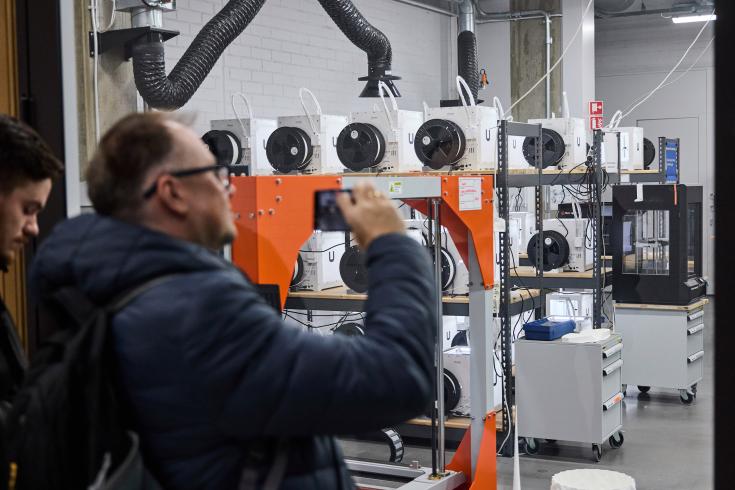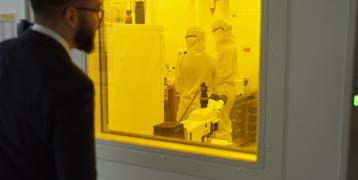Decentralised hubs for improving the innovation capacity of SMEs

On 3 April 2023, the Policy Learning Platform organised an online matchmaking on decentralised hubs for improving the innovation capacity of SMEs.
Our expert Luc Schmerber moderated the session which was organised at the request of the Managing Authority Operational Programme Western Greece (MOU) to meet and exchange with peers from other cities and regions who could share their experiences on the same problem.
Host and participants
- Aris Mamasioulas, MOU Western Greece
- Spyros Papaspyrou, Region of Western Greece
- Christos Tzomakas, Regional Development Fund
- Sofia Karveli, Directorate of Development Planning
- Nancy Trifonopoulou, Technology transfer office, University of Patras
- Anastasia Pyrgaki, Directorate of Development Planning
- Vera Fabinyi, Coral Marie Curie project
- Alain Demarez, Wallonie emploi formation SPW (4.0Ready)
- Frédérik Cambier, Technifutur Competence Centre, (4.0Ready)
- Bernhard Koelmel, Pforzheim University, Digital hub Northern Black Forest
- Jolanta Zubkauskiene, Manufacturing Innovation Valley (Future Ecom)
- Pedro Saraiva, Marco Alves, Tagus Valley (Agri Renaissance)
- Barbara Ślęk-Wojtowska, Anna Piorun, Podkarpackie Center for Innovation, Protolab (Foundation)
- Ilaria Ramaglioni, Policy Officer, Joint Secretariat
- Laurentiu David, Policy Officer, Joint Secretariat
- Luc Schmerber, Policy Learning Platform Thematic Expert
- Sorush Brandenburg, Policy Learning Platform Thematic Assistant
Key Takeaways and insights
- Development of a strong local/regional ecosystem and its value chains: The practices presented clearly demonstrated the importance to involve closely local and regional triple-helix stakeholders, both on the strategic and operational level.
- Access to funding: most initiatives have to rely on multiple funding sources. The strategic involvement of stakeholders is beneficial in terms of overall policy alignment and the related allocation of funding. This can only be realised in the long term when the strategic priorities are aligned. This includes businesses, whose commitment is key.
- Access to expertise: digital and innovation hubs are mostly run by small teams, which rely on external expertise to develop and deliver high-quality service offers. This expertise can easily be found in the local or regional ecosystem. This is more likely to happen when a win-win situation is created for both the hub and the experts.
- Offer targeted services to different target groups: digital and innovation hubs in rural regions with low density of academia and research organisations might have different target groups to serve and involve, e.g. traditional companies. In this case, technology demonstrators play a central role, and setting up additional national or European innovation projects enables the development of new specialised offers in this sense.
- Circular economy should be a transversal offer of DIHs: The hubs presented have mostly integrated sustainability aspects / the transition towards a more circular economy as a transversal priority, which comes in addition to the original focus, be it digital or manufacturing technologies.
You can find a complete overview of all recommendations and takeaways in the follow-up note
Relevant Policy Learning Platform Resources
Image

Policy brief
Image

Smart
Fostering the digital transformation of SMEs
Discover practical examples of how to foster the digital transformation of SMEs from different perspectives.Image

Policy brief
Image

Smart
Spaces for innovation
Explore the importance of five types of spaces for innovation for local and regional development in this policy brief!Image

Policy brief
Image

Smart
Industry 4.0
This policy brief features six policy recommendations to support the development of industry 4.0.Image

Story
Image
Smart
Digital ecosystems and digital transformation
Read about the Interreg Europe projects active in digital ecosystems, digital transformation, remote working and co-working spaces.Image

Story
Image

Smart
Fostering market uptake for innovative digital products and services
This article outlines how you can foster the market uptake for innovative digital products and services.Image

Workshop
Image

Smart
Key learnings: Innovation capacities of SMEs
On 23 February 2022, the online workshop "Innovation capacities of SMEs" took place. Explore the key learnings of this workshop and get inspired!Image

Workshop
Image

Smart
E-workshop recording: SMEs digitalisation
Access the recording and presentations of our workshop on SMEs digital transformation that took place on 10 November and get inspired!
Apply for a matchmaking
Find solutions to your regional policy challenges with our experts and selected peers during a two-hour matchmaking.

